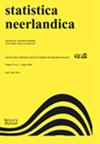通过交叉验证估计密度函数
IF 0.8
3区 数学
Q2 STATISTICS & PROBABILITY
引用次数: 0
摘要
在密度估计中,通常使用平均综合平方误差(MISE)来衡量性能。在这种情况下,交叉验证准则提供了 MISE 减去密度平方积分的无偏估计值。由于已知最小 MISE 趋于零,这表明交叉验证准则的最小值可被视为减去平方密度积分的估计值。与其他所有现有估计器不同的是,这一新颖的建议具有无需选择任何调整参数的突出特点。事实上,本文证明了这种方法能产生一致且高效的估计器,并在实践中表现出卓越的性能。此外,除了这个基本案例,本文还展示了如何利用这一新原理同样处理其他几个关于密度函数估计的问题,从而充分展示了进一步应用的潜力。本文章由计算机程序翻译,如有差异,请以英文原文为准。
Estimation of density functionals via cross‐validation
In density estimation, the mean integrated squared error (MISE) is commonly used as a measure of performance. In that setting, the cross‐validation criterion provides an unbiased estimator of the MISE minus the integral of the squared density. Since the minimum MISE is known to converge to zero, this suggests that the minimum value of the cross‐validation criterion could be regarded as an estimator of minus the integrated squared density. This novel proposal presents the outstanding feature that, unlike all other existing estimators, it does not need the choice of any tuning parameter. Indeed, it is proved here that this approach results in a consistent and efficient estimator, with remarkable performance in practice. Moreover, apart from this base case, it is shown how several other problems on density functional estimation can be similarly handled using this new principle, thus demonstrating full potential for further applications.
求助全文
通过发布文献求助,成功后即可免费获取论文全文。
去求助
来源期刊

Statistica Neerlandica
数学-统计学与概率论
CiteScore
2.60
自引率
6.70%
发文量
26
审稿时长
>12 weeks
期刊介绍:
Statistica Neerlandica has been the journal of the Netherlands Society for Statistics and Operations Research since 1946. It covers all areas of statistics, from theoretical to applied, with a special emphasis on mathematical statistics, statistics for the behavioural sciences and biostatistics. This wide scope is reflected by the expertise of the journal’s editors representing these areas. The diverse editorial board is committed to a fast and fair reviewing process, and will judge submissions on quality, correctness, relevance and originality. Statistica Neerlandica encourages transparency and reproducibility, and offers online resources to make data, code, simulation results and other additional materials publicly available.
 求助内容:
求助内容: 应助结果提醒方式:
应助结果提醒方式:


